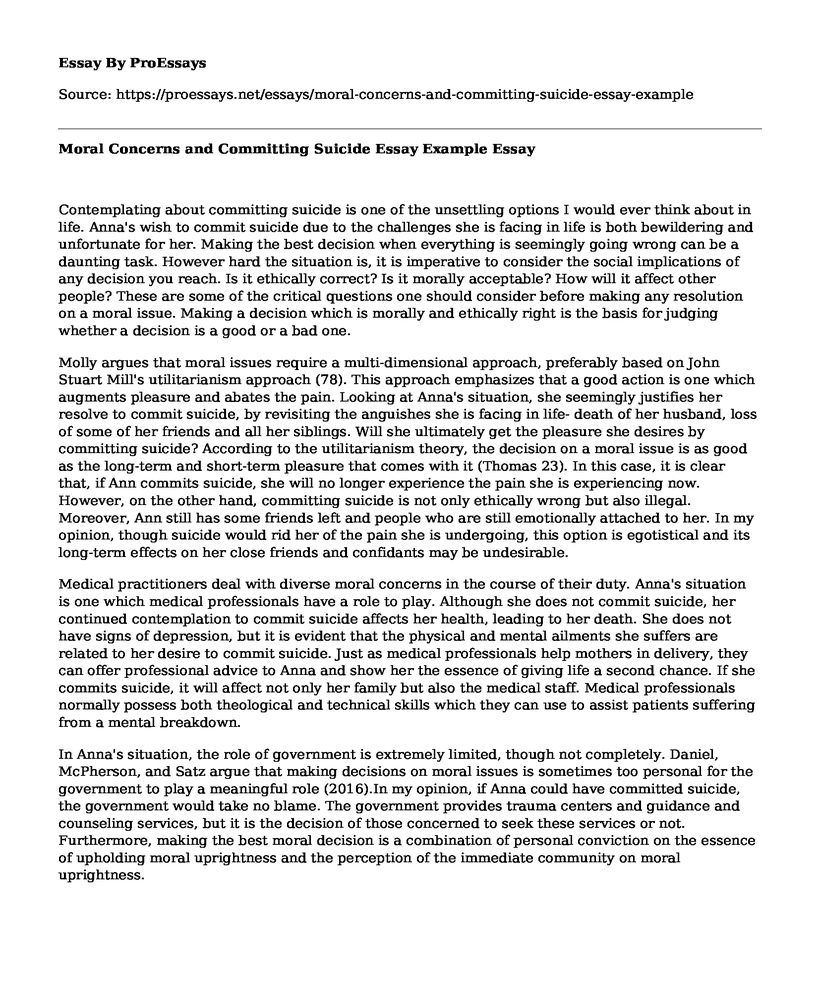Contemplating about committing suicide is one of the unsettling options I would ever think about in life. Anna's wish to commit suicide due to the challenges she is facing in life is both bewildering and unfortunate for her. Making the best decision when everything is seemingly going wrong can be a daunting task. However hard the situation is, it is imperative to consider the social implications of any decision you reach. Is it ethically correct? Is it morally acceptable? How will it affect other people? These are some of the critical questions one should consider before making any resolution on a moral issue. Making a decision which is morally and ethically right is the basis for judging whether a decision is a good or a bad one.
Molly argues that moral issues require a multi-dimensional approach, preferably based on John Stuart Mill's utilitarianism approach (78). This approach emphasizes that a good action is one which augments pleasure and abates the pain. Looking at Anna's situation, she seemingly justifies her resolve to commit suicide, by revisiting the anguishes she is facing in life- death of her husband, loss of some of her friends and all her siblings. Will she ultimately get the pleasure she desires by committing suicide? According to the utilitarianism theory, the decision on a moral issue is as good as the long-term and short-term pleasure that comes with it (Thomas 23). In this case, it is clear that, if Ann commits suicide, she will no longer experience the pain she is experiencing now. However, on the other hand, committing suicide is not only ethically wrong but also illegal. Moreover, Ann still has some friends left and people who are still emotionally attached to her. In my opinion, though suicide would rid her of the pain she is undergoing, this option is egotistical and its long-term effects on her close friends and confidants may be undesirable.
Medical practitioners deal with diverse moral concerns in the course of their duty. Anna's situation is one which medical professionals have a role to play. Although she does not commit suicide, her continued contemplation to commit suicide affects her health, leading to her death. She does not have signs of depression, but it is evident that the physical and mental ailments she suffers are related to her desire to commit suicide. Just as medical professionals help mothers in delivery, they can offer professional advice to Anna and show her the essence of giving life a second chance. If she commits suicide, it will affect not only her family but also the medical staff. Medical professionals normally possess both theological and technical skills which they can use to assist patients suffering from a mental breakdown.
In Anna's situation, the role of government is extremely limited, though not completely. Daniel, McPherson, and Satz argue that making decisions on moral issues is sometimes too personal for the government to play a meaningful role (2016).In my opinion, if Anna could have committed suicide, the government would take no blame. The government provides trauma centers and guidance and counseling services, but it is the decision of those concerned to seek these services or not. Furthermore, making the best moral decision is a combination of personal conviction on the essence of upholding moral uprightness and the perception of the immediate community on moral uprightness.
Conclusion
In conclusion, the extent to which an action ends suffering is often over-emphasized at the expense of looking at the possible displeasure in future. Ending a painful experience leads to immediate but not long lasting pleasure. Also, the pleasure should not lead to displeasure to other people, especially close family members and friends. In Ann's situation, committing suicide should never have been an option-it is immoral, ethically wrong and a decadent act.
Works Cited
Crockett, Molly J., et al. "Harm to Others Outweighs Harm to Self in Moral
Decision Making." Proceedings of the National Academy of Sciences 111.48 (2014): 17320-17325.
Hausman, Daniel, Michael McPherson, and Debra Satz. Economic analysis, Moral Philosophy, and Public Policy. Cambridge University Press, 2016.
Szasz, Thomas. A Lexicon of Lunacy: Metaphoric Malady, Moral Responsibility and Psychiatry. Routledge, 2017.
Cite this page
Moral Concerns and Committing Suicide Essay Example. (2022, May 17). Retrieved from https://proessays.net/essays/moral-concerns-and-committing-suicide-essay-example
If you are the original author of this essay and no longer wish to have it published on the ProEssays website, please click below to request its removal:
- Thesis Example on Iodine-containing Contrast Drugs
- Strategies for Improving Latino Healthcare in America Video Response
- Research Paper on Global Warming and its Impact on our Health
- Essay on Ethical Relativism as an Explanation of Human Morality
- Paper Example on the Disabled: Overcoming Learning Obstacles With Hearing & Sight
- Essay Example on Drug Use & Off-Label Prescriptions in Children: Risking Health?
- 32-Year-Old Man Diagnosed With Myocardial Infarction - Report Example







